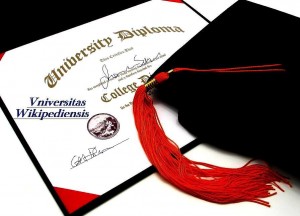A Diploma from ‘Wikipedia University’: a Future Job Requirement and Candidate Asset?

“Dip.W.”?—What’s that? At the moment, only an idea; but considering the not-so-distant future, maybe something to be made available and strongly recommended, if not mandatory: a “Wikipedia University Diploma”.
Flash back to the present; let’s say you are hoping to find a specialized job or candidate—say, one that has a math or medical-focus. In addition to a degree in math or medicine as a job requirement, how about a Wikipedia diploma—that “Dip. W.”, if you will?
To get one, a candidate would have to demonstrate, through testing or other certification, mastery of a specified or selected set of Wikipedia mathematics or medicine topics, written to very exacting standards by certified experts only.
Of course, currently there is neither any such diploma program nor consistency of content quality to capitalize on in this way.
“More Doctors Recommend Wikipedia…”
But, before you dismiss this as a fanciful or outright silly idea, consider the recent report that Wikipedia is already the top information source for physicians and patients. If physicians and patients are satisfied with such content, why not use mastery of it as a credential?
Moreover, if having a Facebook account can become a de facto hiring requirement, why not require a Wikipedia account—with lists of selected Wikipedia page links, “modules” comprising them and results of tests based on them?
Then there is the important issue of “portability” and “transferability” of credentials. Because Wikipedia is global, multilingual and a portal for experts, users and content from virtually every region of the globe, a Dip.W. would be the credential equivalent of a Bitcoin or some other global currency. As such, it would amount to a visa on a passport to anywhere in the modern global informational and economic network.
Moreover, a Dip.W. may provide a credential strong enough to win at least an entry-level position in at least some fields and for candidates unable to attend university or community college. This means a role for a Dip.W. as a preliminary, if not an alternative or supplement to other, e.g., community college 2-year, diplomas, even if it could never substitute for a vocational hands-on training program or a medical, accounting, mathematics or engineering degree.
Wikipedia Med School Credits
With significant upgrades, expansion, enforced standards and certification of content and with robust testing, it could work. In fact, Wikipedia is already functioning, in however a limited way, as a job credential for medical professionals.
In 2013, Dr. Amin Azzam, a health sciences associate clinical professor at the University of California, San Francisco School of Medicine launched the first course to give credit at a U.S. medical school for editing medical content on Wikipedia.
That’s a start toward a formal Wikipedia-based professional certification program [on top of any content certification process]—but only on the content supply side as an editor or contributor, not the demand side, as end user and reader, which of course is a very different thing.
Wikipedia’s Potential Job and Diploma Clout
To get a feel for how this could work, consider Wikipedia’s medicine and math archives. According to its own internal WikiProject data, the top 1,500 Wikipedia medical pages have had a maximum total of almost 250 million visits per month since July 2009—surpassing the U.S. National Institute of Health, WebMD, the Mayo Clinic, the U.N. World Health Organization [WHO] and everybody else, including the leading alternate health site, Mercola.com, which has a reported 30 million page views per month.
That’s a lot of trust and interest.
Now, have a look at those 1,500 topic pages and ask yourself two questions:
1. How many of these topics are inessential to a physician’s training?
2. How many of these topics are of no relevance to my health in general or to my specific health concerns and interests?
If you find many that don’t matter, either you are superhumanly healthy, incredibly incurious or don’t know the difference between a physician and a witch doctor.
The point here is that mastery of many, if not all, of these topics would constitute strong supplementary evidence of a physician’s competence and curiosity, or at least, properly selected, serve as a valuable adjunct to paramedic, nursing or medical student program and credentials, much as national certification exams do in various other professions.
For private practitioners, a Dip.W. could provide the extra clout that can spell the difference between a thriving and a struggling medical, web design, accounting and myriad other occupations—perhaps surpassing “rate my professional” websites in influence and credibility, in virtue of certification, as opposed to the online anecdotal and subjective client reviews of performance [which would be more difficult, if not impossible, to Wikipediaize]. Although performance would, at least initially, be beyond the scope and purview of a Dip.W., professional knowledge base, as a correlated performance factor, would not.
The Future of the Dip.W.
Of course, the issues of content quality, certification and testing are paramount to establishing and implementing a Dip.W. program. As the quality and certification matters stand now, WikiProject assessments of the Wikipedia medical and mathematical pages, for example, are generally in the “B” to “C” range, using a WikiProject “report card” scale, ranging from “FA”—“Featured Articles” to C. The most recent WikiProject statistics indicate that of the total number of approximately 4.4 million articles supported as of December 11, 2013, about 1%, i.e., approximately five thousand, have FA status. That proportion would have to be substantially increased for a Dip.W. program launch and wide acceptance.
Until that happens, uncertified and informal job-related citations of and requests for mastered Wikipedia content by job applicants and employers could get that Dip.W. ball rolling and give a head start to those rising to or posing the Wikipedia mastery challenge. While waiting for the debut of the Dip.W.
In any case and even if the Dip.W. never comes to pass or pass as a credential, it may still have a place in the future of learning.
As a Wikipedia stub.

